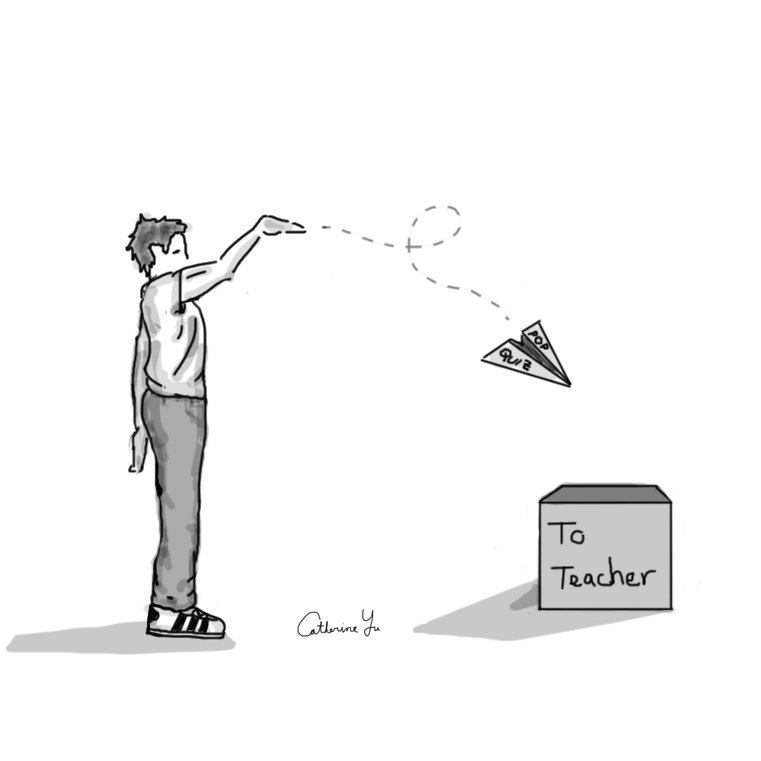Pop quizzes cause undue stress, should be eliminated
“Class, there is a pop quiz.”
For some students, this phrase is bound to evoke panic. Pop quizzes, unlike normal tests and quizzes, are administered without warning to unsuspecting students. Though there may be teachers out there who dole out pop quizzes just for the novelty, most teachers use them to keep students on task by pushing them to continuously study in the event of a pop quiz. Unfortunately, regardless of the intentions behind them, pop quizzes result in stress and panic, while other similar alternatives can still yield the intended benefits.
Stress is normal and, to a certain extent, can even be beneficial for high school students, but no student should ever fear going to class or feel pressured to understand concepts immediately. Senior Emily Zhang took Analysis Honors, a class that used to give out pop quizzes, and Advanced Placement (AP) Calculus BC, a class that continues to give out pop quizzes. The pressure of pop quizzes constantly left her on edge in the classroom, when she should have been focused on learning.
“[Pop quizzes] cause unnecessary stress,” Zhang said. “I remember being scared every time my teacher left the classroom, thinking he would bring back a quiz.”
Furthermore, pop quizzes, especially those that test concepts taught the same day of or two days preceding the quiz, favor those who grasp concepts more quickly over those who learn slower but put in the work to eventually learn the concepts. Senior Kelsey Wang, a former Analysis Honors and AP Calculus BC student, also felt the pressure of having to comprehend a lesson or concept immediately after it was taught while taking these math classes.
“I felt much more stressed if there was a concept I couldn’t immediately grasp because of the possibility of having a pop quiz that I wasn’t ready to take yet,” Wang said. “I felt anxious coming to class if I didn’t feel like I understood the material perfectly.”
The purpose of making quizzes “pop” is to give students an incentive to stay up to date with class content by spacing out their studying, a psychological phenomenon known as the spacing effect. This way, a student will not end up cramming in a unit’s worth of knowledge the night before a test. Spacing out material can help students retain material.
“We know that there’s psychological research that [when] you space out your studying [and] you space out your preparation, you have longer term retention,” AP Psychology teacher Melinda Mattes said. “Pop quizzes, ideally, what they get you to do is space out your studying.”
In theory, the idea behind pop quizzes is sensible, since many students struggle with spacing out their studying. However, this attempt to help students study more efficiently falls short of its goal. Zhang did not change her methods of studying just because she knew there was a possibility of a pop quiz. In fact, because pop quizzes are not set in stone, the unpredictability deterred her from studying.
“I didn’t plan my time out for studying for pop quizzes,” Zhang said. “I was too busy studying for quizzes and tests I knew were going to happen, rather than studying for a quiz that might or might not happen.”
In addition to not fulfilling their purpose, pop quizzes present logistical problems for both teachers. Because students cannot prepare for them ahead of time, instances of cheating increase significantly as many students feel that they are not prepared to take the quiz on their own merit. Mattes stopped giving out pop quizzes in AP Psychology after she saw too many instances of cheating.
“The issue with pop quizzes is that unless you vary it from class to class, the first class gets it [and] they’re at a severe disadvantage because [later periods] find out they have a pop quiz,” Mattes said. “[When] the last class meets the next day… they’re all prepared. … We would vary it and you would never know which class gets it, but then there’s that inconsistency, because then is it really fair that I tested this class on this concept but tested the other class on the other concept?”
To truly help students space out their studying, there are better methods. On top of homework, which is already meant to help students study every day by reinforcing the concepts taught in class, measures such as benchmark quizzes require students to space out studying without the additional stress and temptation to cheat. Already implemented in math classes such as Intro to Analysis and AP Calculus AB, the benchmark quiz system means teachers have a scheduled quiz every day that tests students on the material learned the class before. Unlike pop quizzes, these short quizzes are announced and can be retaken until students get full credit. With this system, students can feel more prepared by studying for a quiz that they know is coming, and they also have no incentive to cheat since they can retake the quiz.
Should implementing the benchmark quiz system be too much trouble or too difficult, regular quizzes also suffice. Quizzes that get spaced out still push students to study, just without the negative consequences.
Pop quizzes fail to actually carry out the spacing effect, and instead, induce a variety of negative effects on students. If stress and cheating are the results of this learning tool, a tool that can easily be replaced with more beneficial methods, then pop quizzes should no longer be an option.
Your donation will support the student journalists of Palo Alto High School's newspaper

